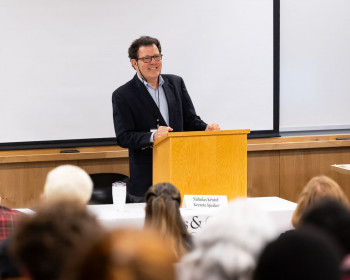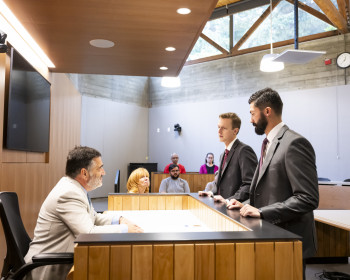Student Selected to Present Paper at Environmental Law Symposium
Sadie Normoyle (’20) will be presenting her paper, “Protecting Water Quality Through Tribal Treaty Fishing Rights: An Analysis of Idaho’s Fish Consumption Rate”, at the University of Arizona’s Next Generation of Environmental Law Symposium in April. The paper will also be published in the Arizona Journal of Environmental Law & Policy in the Summer 2020 issue.
Open gallery

Sadie Normoyle (’20) will be presenting her paper, “Protecting Water Quality Through Tribal Treaty Fishing Rights: An Analysis of Idaho’s Fish Consumption Rate”, at the University of Arizona’s Next Generation of Environmental Law Symposium in April. The paper will also be published in the Arizona Journal of Environmental Law & Policy in the Summer 2020 issue.
The paper looks at how the Columbia River tribes’ treaty fishing rights can be used to require more stringent water quality standards in Idaho. Normoyle looks at the specific language of the Columbia River Treaty, as well as relevant treaty fishing rights case law, the federal trust doctrine, the Clean Water Act (CWA), and other federal mandates such as Executive Order 12898, as legal tools for requiring more stringent water quality standards to ensure the health of those who eat salmon.
“My paper article asserts that courts need to recognize tribal treaty rights include a right to the protection of human health,” stated Normoyle. “If eating salmon in traditional quantities is dangerous to human health, this is a violation of tribal treaty fishing rights.” The paper argues there is an obligation to regulate water quality in the Columbia River, and in Idaho specifically, at more stringent levels to ensure that these treaty rights are not infringed. The conclusion of the paper is that tribal treaty rights include not only the right to allocation and abundance of resources but also the right to the protection of the quality of resources.
The paper began as a capstone for the Law of the Columbia River class last spring. Normoyle became inspired to write on this topic after hearing a guest speaker in the class talk about fish consumption rates in Washington, Oregon, and Idaho. “We learned about how disproportionate the amount of daily fish consumed is for tribal members compared to the rest of the population, and how the current fish consumption rates aren’t usually adequate to protect tribal health,” stated Normoyle. “I then started thinking about legal arguments that could be made to require stronger water quality protection, so that larger amounts of fish would be safe to consume.”
Normoyle will graduate from Lewis & Clark Law School in May 2020 and plans to continue working on both environmental and tribal law issues in the Northwest. “I think that living in the Northwest it is important to be aware and engaged in legal issues involving tribes and tribal members, especially relating to water law,” Normoyle said.
Law Communications is located in room 304 of Legal Research Center (LRC) on the law Campus.
MSC: 51
email jasbury@lclark.edu
voice 503-768-6605
Cell: 626-676-7923
Assistant Dean,
Communications and External Relations, Law School
Judy Asbury
Law Communications
Lewis & Clark Law School
10101 S. Terwilliger Boulevard MSC 51
Portland OR 97219

